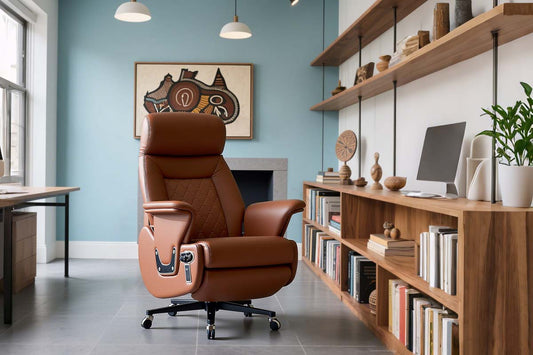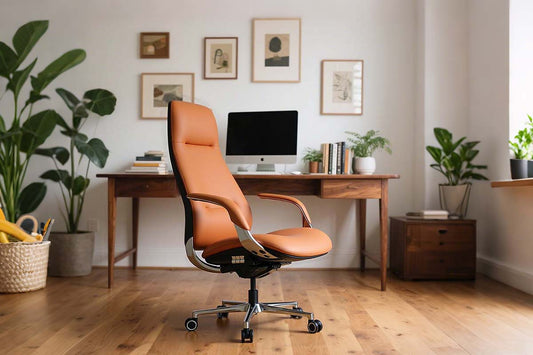
Do High-Back Chairs Really Protect Your Neck? A Scientific Look at Ergonomic Design
Share
Neck pain is no longer exclusive to the elderly. For professionals spending 6–10 hours a day seated at a desk, it has become a quiet epidemic. In this context, ergonomic high back chairs—especially high back executive office chairs—are often recommended for their claimed neck-supporting benefits. But is it really the back height that makes the difference?
Let’s explore the truth behind this design trend from the perspective of spinal health, ergonomic engineering, and expert research.

Why Is Neck Pain So Common Among Desk Workers?
The human cervical spine (C1–C7) has a natural lordotic curve designed to support the weight of the head and absorb shock. Poor posture from prolonged sitting—especially in chairs without proper chairs back support—can flatten this curve, leading to tension, stiffness, and even early degeneration.
According to Harvard Health Publishing, incorrect sitting posture and lack of ergonomic neck support are among the leading contributors to chronic neck and shoulder discomfort in professionals over 40.

What Does a High-Back Chair Actually Do?
A proper executive chairs back support system doesn’t just “go higher”—it follows the natural curve of the entire spine, from the lumbar through thoracic up to cervical. A well-designed luxurious office chair supports the shoulders, neck, and even the base of the skull, allowing muscles to relax and pressure to distribute evenly.
Take, for example, the Asari Leather Executive Massage Chair by POVIMO. It’s crafted with a deep-curved high back and an adjustable headrest that directly supports the occipital region. It’s more than luxury—it’s clinical design.
Does Science Support the Neck Benefits of High-Back Chairs?
Yes—but with caveats. The Spine-Health Journal reports that high-back ergonomic chairs reduce muscular tension in the mid-to-lower cervical spine when the headrest and backrest are properly aligned. However, fixed-height headrests and rigid back angles negate these benefits.
In other words, not all chairs executive executive options are equal. Look for chairs that adapt to your body—not the other way around.

How to Choose a High-Back Chair That Truly Supports Your Neck
1. Look for Adaptive Structure
A real neck-supporting executive leather office chair must offer:
- A full-height backrest that reaches or supports your head
- Adjustable headrest positioned at the base of your skull
- Continuous lumbar to cervical support in an S-curve shape
- Resilient but breathable materials like memory foam or real leather
The Finnley Executive Massage Chair offers this with electric adjustment and real leather upholstery—ideal for long hours and thermal relief.
2. Prioritize Seat Cushioning
Seat comfort matters more than you think. Poor seat bases tilt your pelvis forward, putting pressure on the spine. The best office chair cushion solutions use multi-density foam and contouring support.
The Alex Leather Desk Chair by Arhaus delivers plush cushioning and elegant posture alignment—perfect for design-focused users seeking substance and style.
3. Look for Customization Features
True best office chair for long hours options must allow full adjustment: tilt locking, headrest height, seat depth, lumbar position, and more.
POVIMO’s Bowie Executive Chair excels in this. With four-point recline and synchronized headrest-lumbar adjustments, it suits taller users and longer sessions alike.
How Do Other Brands Compare?
| Brand | Model | Adjustable Headrest | Full Back Support | Massage Function | Price |
|---|---|---|---|---|---|
| POVIMO | Asari / Bowie / Finnley | Yes | Yes | Yes | $1,000+ |
| Arhaus | Alex Chair | Yes | Yes | No | $1,300 |
| Herman Miller | Embody | No | No | No | $1,500 |
| La-Z-Boy | Trafford High Back | Yes | Yes | No | $900–1,100 |

Conclusion: High Doesn’t Always Mean Supportive
A high back executive office chair is only effective when it adapts to your spinal curvature and work habits. If you’re investing in your health and productivity, consider:
- Spinal curve matching (S-shape design)
- Fully adjustable lumbar and headrest zones
- Pressure-dispersing cushions and breathable surfaces
- Custom fit for your height and daily workflow
Explore ergonomic, neck-friendly seating options for professionals over 40 at POVIMO’s Executive Chair Collection.
Explore these expert-recommended options:
Explore Our Signature Executive Chairs
FAQs
Q: I’m under 5'6". Will a high-back chair support my neck properly?
A: Look for adjustable headrests to prevent awkward positioning. Brands like POVIMO and La-Z-Boy offer excellent adaptability.
Q: Is leather better than mesh for support?
A: A leather office chair offers better contouring and durability if high-quality leather is used. Avoid bonded or faux leather for long durations.
Q: Can a high-back chair pair well with a standing desk?
A: Absolutely—just ensure the chair has seat height flexibility and a tilt-lock recline to switch between sitting and leaning efficiently.







